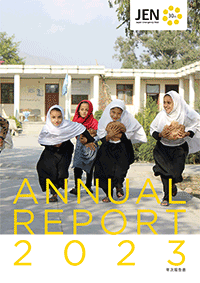Fresh Off the Press! Za’atari Magazine gives refugees a new tool for communication
In January 2014, JEN, in partnership with UNHCR, began a new endeavor to create a monthly Arabic magazine to be distributed in Za’atari Refugee Camp. Living in a camp that spans up to 6 square kilometers, communication between refugees living in different districts can be difficult. The magazine, written almost entirely by Syrian refugees themselves, aims to provide a new vehicle of communication between refugees living in Za’atari refugee camp. In addition, the magazine will serve as a tool to spread messages related to better living in the camp by UN agencies and other humanitarian organizations, through the perspective of refugees. By including positive stories written by refugees, JEN hopes that the magazine can also highlight the creativity if refugees living in the camp and showcase their resilience.
The inaugural issue was published at the end of April 2014 and distributed to all households in the camp – approximately 20,000 – during the first two weeks of May 2014. The first issue includes stories of refugee hygiene promoters advocating for the importance of maintaining environmental hygiene and keeping solid waste pollution to the minimum in the camp; stories from children who enjoy spending their time in sports clubs that are offered by humanitarian organizations; stories from a refugee whose child’s health was recovered through nutrition programs that are offered in the camp; and a poem from a girl who reminisces her life back in Syria and hopes to be reunited with her beloved home.
[An older girl reads one of the articles to younger girls.]

[A father and son reading the first issue of Za’atari Magazine.]

The magazine “Al Tarik (The Road)” was given its name to reflect on the journey refugees have made to come to Za’atari and to signify the hope for the future – that the life in the camp is just a temporary stop and there is a road ahead back to Syria.
[The “Road” in Za’atari]

Though the articles are written by refugees, the magazine is currently coordinated and edited by Jordanian staff. As the magazine gets good traction among refugees in Za’atari Camp, JEN plans to work with other organizations to create training opportunities in skills related to magazine development, such as journalism and graphic designing, so that, over time, the magazine can be entirely written and produced by Syrian refugees. By doing so, the project can also create opportunities for the refugees, especially youth who makes up a large majority of the camp residents, to be involved in activities that can improve their lives at the camp.
【JEN is now accepting donations. Your help would be very much appreciated.
DONATE here】

![Jordan[Syrian refugees] Blog](/en/project/images/mainimg_project_jordan.jpg)




